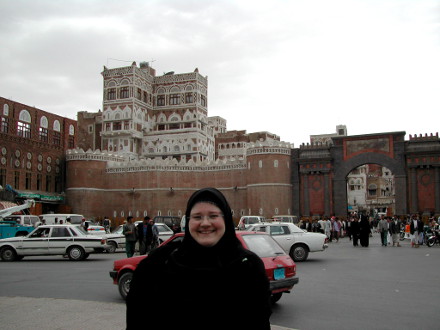Dr Rachel Woodlock
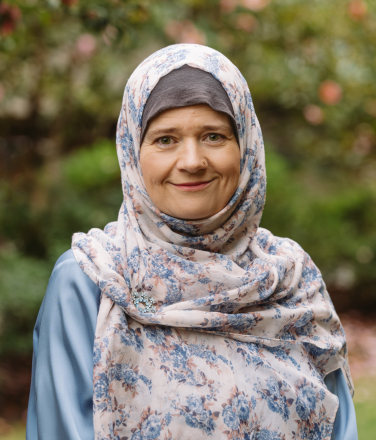
Rachel Woodlock is a Lecturer in Islamic Studies at the Asia Institute, University of Melbourne and Deputy Director of the National Centre for Contemporary Islamic Studies. She is an academic and writer who researches and teaches about Islam and Muslims. She also holds a keen interest in incorporating GenAI tools into research and teaching.
Her most recent work is "Islam and Gender Reform" in The Oxford Handbook of Islam and Reform, ed. Emad Hamdeh and Natana Delong-Bas (Oxford University Press, in press). She co-edited Fear of Muslims? International Perspectives on Islamophobia with Douglas Pratt (Springer, 2016), an evidence-based examination of Islamophobia in both 'old-world' Europe and the 'new-world' of America and Australia, and also Southeast Asia. She also co-wrote For God's Sake: An Atheist, a Jew, a Christian and a Muslim Debate Religion (Pan MacMillan, 2013), discussing some of life's biggest questions.
She completed a Bachelor of Arts (Arabic & Islamic Studies) and a Master of Islamic Studies at the University of Melbourne, and her doctoral research undertaken at Monash University looked at the social integration of religious Muslims in Australia. She also worked as an Assistant Lecturer in the Study of Religions department, University College Cork in Ireland. Rachel has lectured widely and taught subjects on Islam and Muslims at undergraduate and postgraduate levels. She has also extensively written for, and appeared in, the media in both Australia and Ireland.




Writing
Annotated Bibliography
- 2013. "Islam in Australia." In Oxford Bibliographies in Islamic Studies, ed. Andrew Rippin. New York: Oxford University Press.
Books & Whole Journals
-
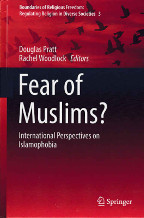 2025. Islam and minorities' rights. Melbourne Asia Review 23. Melbourne: Asia Institute. Co-edited with Muhammad Kamal.
2025. Islam and minorities' rights. Melbourne Asia Review 23. Melbourne: Asia Institute. Co-edited with Muhammad Kamal. - 2016. Fear of Muslims? International Perspectives on Islamophobia. Boundaries of Religious Freedom: Regulating Religion in Diverse Societies. Switzerland: Springer. Co-edited with Douglas Pratt.
- 2013. For God's Sake: An Atheist, a Jew, a Christian & a Muslim Debate Religion. Sydney: Pan Macmillan. With Jane Caro, Antony Loewenstein, and Simon Smart.
- 2012. Isolation, Integration and Identity: The Muslim Experience in Australia. The La Trobe Journal, 89. Co-edited with John Arnold.
Chapters
- In press. "Islam and Gender Reform." In The Oxford Handbook of Islam and Reform, eds. Emad Hamdeh and Natana Delong-Bas. Oxford: Oxford University Press.
- 2016. "Identity and Islamophobia: An Australian Investigation." In Fear of Muslims? International Perspectives on Islamophobia, eds. Douglas Pratt and Rachel Woodlock, Boundaries of Religious Freedom: Regulating Religion in Diverse Societies, pp. 131–151. Switzerland: Springer.
- 2016. "Introduction: Understanding Islamophobia." In Fear of Muslims? International Perspectives on Islamophobia, eds. Douglas Pratt and Rachel Woodlock, Boundaries of Religious Freedom: Regulating Religion in Diverse Societies, pp. 1–18. Switzerland: Springer.
- 2015. "Muslim Religiosity: An Analysis of Salience and Practice among Muslims Living in Victoria and New South Wales." In Muslim Identity Formation in Religiously Diverse Societies, eds. Derya Iner and Salih Yücel, pp.127–54. Newcastle upon Tyne: Cambridge Scholars Publishing. (Pre-pub. version)
- 2012. Introduction. In Isolation, Integration and Identity: The Muslim Experience in Australia. Edited by Rachel Woodlock and John Arnold. The La Trobe Journal, 89.
- 2011. "Many Hijabs: Interpretative Approaches to the Question of Islamic Female Dress." In Sociology of Islam: Secularism, Economy and Politics,ed. Tugrul Keskin, pp.395–418. Reading, UK: Ithaca Press. (Pre-pub. version)
-
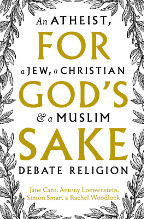 2009. "Islamic Beliefs and Practices." In Encyclopedia of Religion in Australia, ed. James Jupp, 418–36. Port Melbourne, Vic. Cambridge University Press. (Pre-pub. version)
2009. "Islamic Beliefs and Practices." In Encyclopedia of Religion in Australia, ed. James Jupp, 418–36. Port Melbourne, Vic. Cambridge University Press. (Pre-pub. version)
- 2009. "Perceptions of extremism among Muslims in Australia." Proceedings of the 2008 GTReC International Conference, November 26-27, eds. Sayed Khatab, Muhammad Bakashmar and Ela Ogru, pp.60–85. Caulfield, Vic.: Global Terrorism Research Centre, Monash University.
- 2006. "A Muslim Perspective." In Doing December Differently: An Alternative Christmas Handbook, ed. Nicola Slee and Rosie Miles, 111–116. Glasgow, UK: Wild Goose Publications.
Peer-Reviewed Articles
- 2025. "A triple threat: The increasing securitisation of Iran’s Baha’is." Melbourne Asia Review 23
- 2025. "Introduction: Navigating faith and tolerance in the Muslim experience." Melbourne Asia Review 23
- 2018. "Islam as Support and Stigma for Muslim Migrants and their Children." Islamic Perspective 20: 27–43.
- 2012. "Muslim Wellbeing in Australia: An Analysis of Personal and National Wellbeing Among a Sample of Muslims Living in New South Wales and Victoria." Islam and Christian–Muslim Relations 23(2): 181–200. (Pre-pub. version)
- 2011. "Being an Aussie Mossie: Muslim and Australian Identity Among Australian-born Muslims." Islam and Christian–Muslim Relations 22(4): 391–407. (Pre-pub. version)
- 2010. "Praying Where They Don't Belong: Female Muslim Converts and Access to Mosques in Melbourne, Australia." Journal of Muslim Minority Affairs 30(2): 265–78. (Pre-pub. version)
- 2010. "Problems with the Avicennian concept of God's knowledge." Islamic Perspective 3: 103–07.
- 2010. "The Masjid is for Men: Competing Voices in the Debate About Australian Muslim Women's Access to Mosques." Islam and Christian–Muslim Relations 21(1): 51–60. (Pre-pub. version)
Presentations
- Irish Society for the Academic Study of Religions. Sixth Annual Conference: "Religion, Myth and Migration". Waterford, 16 Jun. 2017.
- Australasian Conference on Islam: "Muslim Identity Formation in Religiously Diverse Societies". Sydney, 25–26 Nov. 2013.
- Course: "Our World in Crisis". Centre for Dialogue, La Trobe University, 2010.
- The Parliament of the World's Religions. Melbourne, 3–9 Dec. 2009.
- International Society for the Sociology of Religion. Annual Conference: "The Challenges of Religious Pluralism". Santiago de Compostela, Spain, 27–31 Jul. 2009. With Susan Carland.
- Global Terrorism Research Centre. International Conference: "Radicalisation Crossing Borders: New Directions in Islamist and Jihadist Political, Intellectual and Theological Thought and Practice". Melbourne, 26–27 Nov. 2008.
- Conference: "Cultural Diversity and Social Harmony: The Goulburn Valley Experience". Shepparton, 26–27 Sept. 2007.
- Conference: "Sawt (Voices) of Women: National Conference on Muslim Women". Canberra, 1 Sept. 2006.
- Mock United Nations Forum. "Clash of Civilizations". Monash University, 2006. With Andrew Bolt and Professor William Maley.
Posters
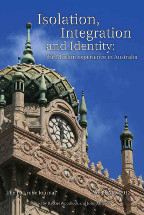
Reports
- 2010. "Conflict and Religion as Globalizing Agent." In Mapping Violence in Southern Thailand, eds. Virginie Andre and Pete Lentini. Interim report to the European Commission. Caulfield, Vic.: Global Terrorism Research Centre.
- 2009. Key Concepts in Islamic Discourse and Listed Terrorist Use of Media Component I: On Jihad, Mujahidin and Martyrdom. Report presented to Australian Communications and Media Authority. Caulfield, Vic.: Global Terrorism Research Centre. With Sayed Khatab, Muhammad Bakashmar and Pete Lentini.
- 2009. Muslim Voices: Hopes and Aspirations of Muslim Australians. Caulfield, Vic.: Centre for Muslim Minorities & Islam Policy Studies. Supervised by Gary D. Bouma and Shahram Akbarzadeh.
- 2009. Mapping Employment and Education among Muslim Australians. Caulfield, Vic.: Centre for Muslim Minorities & Islam Policy Studies. Supervised by Gary D. Bouma and Shahram Akbarzadeh.
- 2006. Social Integration of Muslims in Cobram. Clayton, Vic.: Centre for Muslim Minorities & Islam Policy Studies. Supervised by Gary D. Bouma and Shahram Akbarzadeh.
Reviews
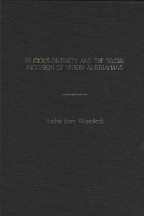
- 2024. Review of Women in the Mosque: A History of Legal Thought and Social Practice by Marion Holmes Katz. Politics, Religion & Ideology 1–3.
- 2022. Review of Minority Religions under Irish Law: Islam in National and International Context edited by Kathryn O’Sullivan. Islam and Christian–Muslim Relations 33(3): 320-22.
- 2014. Review of Essentials of Ibāḍī Islam by Valerie J. Hoffman. American Journal of Islamic Social Sciences 31(1): 114–116.
- 2013. Review of Islam and Liberal Citizenship: The Search for an Overlapping Consensus by Andrew F. March. American Journal of Islamic Social Sciences 30(1): 115–117
- 2012. Review of An Introduction to Said Nursi: Life, Thought and Writings by Ian Markham and Suendam Birinci. Islam and Christian–Muslim Relations 23(3): 407–408.
- 2012. Review of Muslim Women of Power: Gender, Politics and Culture in Islam by Clinton Bennett. Islam and Christian–Muslim Relations 23(1): 96–97.
Thesis
- 2015. "Religious Diversity and the Social Inclusion of Muslim Australians". PhD Thesis. Caulfield: Monash University.
Unpublished Fiction & Poetry




Media
Audio & Visual
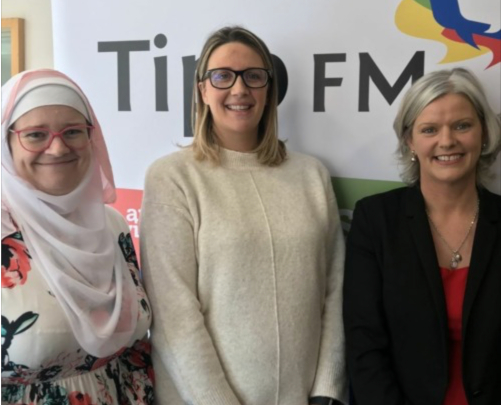
- 2024. "New Laws Silence Afghan Women, Who Will Be Their Voice?" Interview with Claire Murphy (host). The Quicky (Mamamia), August 29.
- 2024. "If chatbots are polluting the commons of human communication, what are the moral consequences?" with Waleed Aly and Scott Stephens (hosts). The Minefield (ABC Radio), May 26.
- 2017–22. "Friday Panel" with Fran Curry (host). Tipp Today (TippFM).
- 2021. Interview with Ciara Plunkett, Kildare Focus, (Kfm), Sep. 28.
- 2021. A Word in Edgeways (RTÉ Radio 1), Jul. 20.
- 2021. "Eid al-Adha" with Ciera Kelly (host). Newstalk Breakfast (Newstalk), Jul. 20.
- 2021. "Irish Experience of Ramadan" with Fran Curry (host). Tipp Today (TippFM), May 6.
- 2019. The Leap of Faith, with Dr Anne Francis, Canon Ruth Elmes, and Rabbi Baroness Julia Neuberger. (RTÉ Radio 1) March 8.
- 2017. Interview on 'World Hijab Day', with Brigid Aylward, and Bara Alich. The Ray D'Arcy Show, (RTÉ Radio 1) January 30.
- 2013. "Does Religion Cause Violence?" with Ross Reynolds (host) and Professor James Wellman. The Conversation (KUOW Seattle News & Information) July 8.
- 2013. Interview, with Jane Caro, Antony Loewenstein, and Simon Smart. Live Talk with Philip Kafcaloudes (ABC Radio Australia) July 8.
- 2013. "Does Religion Cause Most Conflict?" with Jane Caro, Antony Loewenstein, and Simon Smart. Weekend Sunrise (Channel 7) July 7.
- 2012. "Islamic Groups Condemn Violent Protest" with Waleed Aly (host) and A/Prof. Mohamad Abdalla. RN Drive (ABC Radio), September 17.
- 2012. "Drawing Room" with Waleed Aly (host) and Dr Clare Wright. RN Drive (ABC Radio), June 13.
- 2012. "Religion and Ethics with Scott Stephens." RN Drive (ABC Radio), March 27.
- 2009. "Sarah and Hagar: A Tale of Two Women." The Spirit of Things (ABC Radio), December 13.
- 2009. "Talkback: Marrying Out of the Faith." Life Matters (ABC Radio), October 16.
- 2005. "Episode 1." Speaking in Tongues, November 7.
- 2021. "Why the Way We Look at Women Matters." In RTÉ Brainstorm, Sep 27.
- 2021. "How Anti-Semitism and Islamophobia Have Much in Common." In RTÉ Brainstorm, May 27.
- 2021. "Rachel Woodlock: An Irish experience of Ramadan in lockdown." In the Irish Examiner, April 23.
- 2020. "A Debate about Islamophobia, Christophobia, and Religious Freedom." In Counterpoint, October 28.
- 2019. "White Defensiveness in Morrison's Cook Gaffe." In Eureka Street, 29(1), January 24.
- 2018. "Ireland's Brexit Troubles." In Eureka Street, 28(22), November 2.
- 2018. "The Trials of Finding a Good Nursing Home." In Eureka Street, 28(18), September 19.
- 2018. "Dismantling Dutton's Race-Baiting." In Eureka Street, 28(14), July 23.
- 2018. "What Major Religions Really Say About Suicide." In Eureka Street, 28(12), June 14.
- 2018. "Love Answers Punish a Muslim Hate Campaign." In Eureka Street, 28(6), April 4.
- 2018. "Australia's Gay Muslims Face a Double Bind." In Eureka Street, 28(1), January 17.
- 2017. "They're Not Lone Wolves, They're Canaries." In Eureka Street, 27(22), November 13.
- 2017. "Raising Girls in an Unjust World." In Eureka Street, 27(18), September 14.
- 2017. "The Government Should Stop Marrying People." In Eureka Street, 27(17), September 6.
- 2017. "Do We Ban the Nun's Veil Next?" In Eureka Street 27(16), August 23.
- 2017. "Respecting Australian law is key to religious freedom." In Eureka Street 27(14), July 20.
- 2017. "Muslim Feminists Have Their Work Cut Out for Them." In Eureka Street 27(10), May 28.
- 2017. "Gambling on the Fat Dollar." In Eureka Street 27(5), March 22.
- 2017. "What the Sharia is All the Fuss About?" In Eureka Street 27(4), February 23.
- 2017. "The Australian Bureaucratic Mean Virus is Epidemic." In Eureka Street 27(2), January 26.
- 2016. "Islamophobic Racism is a Blunt Weapon." In Eureka Street 26(22), November 14.
- 2016. "Pauline's Peddling the Hate Again." In Eureka Street 26(18), September 15.
- 2016. "All Hail the Burkini's Blend of Islamic Values and Western Lifestyle." In the Guardian, August 25.
- 2013. "How do we know right from wrong?" Extract from For God's Sake: An Atheist, a Jew, a Christian and a Muslim Debate Religion published at Religion & Ethics (ABC Religion), October 1.
- 2013. "Doesn't Religion Cause Most of the Conflict in the World?" Extract from For God's Sake: An Atheist, a Jew, a Christian and a Muslim Debate Religion published in "Comment is Free," Guardian July 2. With Antony Loewenstein, Jane Caro, Simon Smart.
- 2013. "Why a White, Middle Class Aussie Woman Became Muslim." In Sunday Style magazine, Daily Telegraph June 30.
- 2013. "Muslims Must Speak Out Against Iran's Un-Islamic Persecution of Baha'is." Religion & Ethics (ABC Religion), May 1
- 2012. "Proselytising for Humanism: Just How Irreligious are these Atheists?" Religion & Ethics (ABC Religion), August 3.
- 2012. "The Dignity of the Feminine in Islam: Against Zizek's Orientalism." Religion & Ethics (ABC Religion), May 15.
- 2012. "The Qur'an, Violence and the Struggle for Peace." Religion & Ethics (ABC Religion), May 2.
- 2012. "Angels or Animals? The Problem of Muslim Stereotyping." Religion & Ethics (ABC Religion), April 3.
- 2012. "Understanding the Cancer of Jihadism." Religion & Ethics (ABC Religion), March 27.
- 2012. "Muslims: Things You Don't Have to Worry About." In the King's Tribune, January.
- 2011. "Has Multiculturalism Failed Us? Time for Kaleidoculture." In the King's Tribune, November.
- 2011. "Anti-Muslim Tub-Thumping Breeds Extremism." In the Age, March 23.
- 2010. "Ayaan's Allah is an Idol." Religion and Ethics (ABC Religion), July 30.
- 2010. "Science and the Supernatural." Questions of Faith (ABC Religion), March 15.
- 2010. "Misrepresenting the Other." Questions of Faith (ABC Religion), March 14.
- 2010. "Muslims the Focus of Misplaced Fears." In the Age, February 20.
- 2010. "Land of Opportunity, But Not for Monoculturalists." In OnlineOpinion, February 17.
- 2009. "The Islamicity of Different interpretations of HIJĀB." Sociology of Islam & Muslim Societies Summer (Summer): 7–9.
- 2008. "Polygamy is a Reality for Some Families." In the Age, June 28.
- 2007. "A Glaring Double Standard on Women." In the Sunday Age, May 6.
- 2006. "Scanty Clothing Never Justifies Rape." In the Sunday Age, October 29. With Anna Halafoff.
- 2006. "What About the Other Language Barrier?" In the Sunday Age, September 10.
- 2006–2012. "Faith." Contributor in the Sunday Age.












